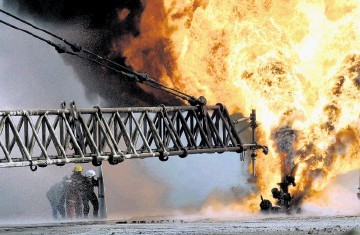
FOR many, the turning of the year is a time of reflection; especially what we could have and perhaps should have done better during the old year and laying grand plans for the new one . . . personal if not corporate.
I’m certainly guilty of that. But what I’ve been reflecting on more than most things of late is the deteriorating situation in Iraq and the crisis that few say much about, Kazakhstan.
What has helped to really drive home to me is footage on the “musingsoniraq” blog and especially a clip showing the hijacking of oil from a pipeline in Iraq, and police firing on striking oil workers in Kazakhstan.
I hardly need mention the avalanche of news flooding out of Iraq, not least the final withdrawal of US troops, what appears to have the hallmark of a systematic terror bombing campaign in Baghdad and attempted assassination of prime minister Nouri al Maliki, all meant to further destabilise a government widely regarded as weak, and the warrant issued for the arrest of the country’s Sunni Arab vice-president, Tareq al Hashemi, that has inflamed already overheated sectarian tensions.
And then there’s Exxon-Mobil, which has deliberately set out to test the Iraqi political system by signing production-sharing contracts with the Kurdish regional government . . . an action variously vigorously condemned and tacitly approved within the Baghdad government, depending on the politics and religious persuasions of those concerned.
The US super-major has been threatened with withdrawal of its licence covering rehabilitation of the huge West Qurna I field in southern Iraq as a retaliation to the Kurdish deal.
The problem for the Iraqi government is that it badly needs companies with know-how and financial muscle to revitalise its battered oilfields, rebuild then extend oil production, capitalise on hitherto wasted gas and achieve this while not over-exposing itself to Western influence, nor undue pressure from China or other resource-hungry East Asian countries.
It goes without saying that Washington will be squarely behind Exxon’s decision to spread its risk beyond straightening out and redeveloping the West Qurna I field in southern Iraq, even if it doesn’t say so in public.
That Exxon and its partners in West Qurna are embroiled in a $50million payment dispute with the Iraqi government over Qurna.
The unexplained failure to pay Exxon, the only American oil company operating in southern Iraq, for nearly two years of work demonstrates the dangers that can confront Western companies seeking to do business there in this supposedly liberated country where the seeds of “democracy” have supposedly been sewn by Yanks, Brits and other do-gooder nations.
Aside from the news reports, if you want a graphic illustration of how fragile Iraq is, go on to YouTube.
It shows in detail, a pipeline being broached and a queue of road tankers waiting to scavenge black crude flooding out of the breach. And police vehicles are clearly visible . . . those inside apparently condoning the piracy.
Here in Aberdeen we have been accustomed to doing business with Kazakhstan, or rather the oil and gas supply chain has. Indeed Kazakhstan has become a fairly important trading partner, though there have been bad experiences for some.
A good friend of mine with a boutique service company was burned through an encounter with corruption (which is apparently rife) and suffered badly as a result.
Some years ago I wrote about oil-worker strikes in Kazakhstan; guys at the “coalface” fed-up with being ripped off by their employers . . . certain Kazakh energy companies.
Well, they’re still at it . . . I mean managers bent on lining their own pockets and screwing the workers.
The situation boiled over on December 16, the 20th anniversary of Kazakhstan’s independence from the yoke of Soviet Communism.
That day, riot police slaughtered up to 70 striking oil workers, wounding 500-800 and arresting scores in the regional city of Zhanaozen, or so it has been claimed.
The official figures are far smaller . . . around 15 dead; naturally.
Why did this go largely unreported; because the Kazakh authorities cut off access to twitter and cell phone coverage – so isolating the region from outsiders.
However, at least one video slipped under the wire, and it was posted on YouTube for all to see.
The company at the eye of this particular storm is said to be KazMunaiGaz, which is basically controlled by the billionaire son-in-law of Kazakhstan’s western-backed president for life . . . Nursultan Nazarbayev.
Leaving aside earlier rounds of protests, Kazakh oil workers have been striking since the beginning of summer for the right to unionise, and for better pay. That’s familiar, is it not?
In response, the state-run oil company has already fired hundreds of workers for allegedly “violating labour laws,” while dividing up communities and the workforce.
By September, workers who held out with the strike were reported to be on the verge of starvation. Amnesty International and Human Rights Watch took the Kazakh authorities to task for their handling of the workers.
Journalists have been barred from access to Zhanaozen and, apparently, two Russian reporters have been were arrested.
However, it would appear that journalists within the city and who attended the city’s police station for a briefing “reported hearing screams coming from what may be interrogation rooms, while a number of men with bloodied faces were lined up in the corridors with their faces against the wall”.
If any of the foregoing is true and of course it broadly probably is, then Western companies active in Kazakhstan need to seriously question their own part in creating such an appalling, inexcusable situation. And that’s from mighty Chevron and mid-ranker BG Group right down to the smallest service company.
As for turning a blind eye; what can one say? Personally, that disgusts me.